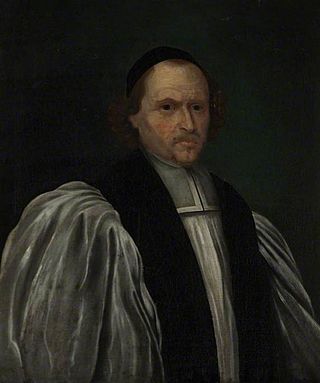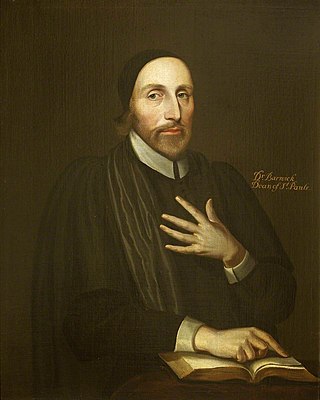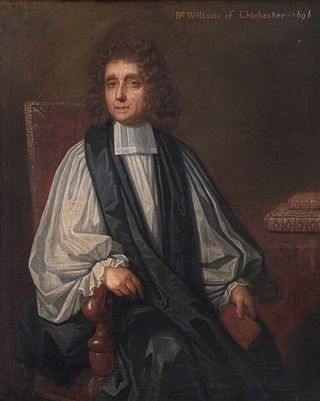Related Research Articles

Richard Sterne was a Church of England priest, Archbishop of York from 1664 to 1683.
William Fuller (1608–1675) was an English churchman.

William Piers was Vice-Chancellor of Oxford University from 1621 to 1624, Bishop of Peterborough from 1630 to 1632 and Bishop of Bath and Wells from 1632 until the abolition of episcopacy in 1646, then again from the Restoration in 1660 to his death in 1670.
Nicholas Claket was an English bishop.

Samuel Fell D.D. was an English academic and clergyman, Dean of Christ Church, Oxford and Vice-Chancellor of the University of Oxford during the First English Civil War.

John Barwick (1612–1664) was an early English royalist churchman and Dean of St. Paul's Cathedral.

John Williams was an English Bishop of Chichester.

Robert Grove (1634–1696) was an English Bishop of Chichester.

William Stanley (1647–1731) was an English churchman and college head, Master of Corpus Christi College, Cambridge, Archdeacon of London and Dean of St Asaph.

Robert Morgan was a Welsh Bishop of Bangor.
John Owen (1580–1651) was an English bishop of St Asaph.
Richard Alvey was an English clergyman, known as the master of the Temple Church.
Henry Vincent Bayley (1777–1844) was an English clergyman. Of the High Church party and a reformer, he became Archdeacon of Stow. He associated with the Hackney Phalanx group of High Church activists.
Philip Baker, D.D., was provost of King's College, Cambridge.
James Bentham was an English clergyman, antiquarian and historian of Ely Cathedral.

Andrew Snape (1675–1742) was an English cleric, academic and headmaster, provost of King's College, Cambridge, from 1719.
Robert Pory or Porey (c.1608?–1669) was an English churchman, archdeacon of Middlesex from 1660.
John Denne D.D. (1693–1767) was an English churchman and antiquarian, Archdeacon of Rochester from 1728.
John Hey (1734–1815) was an English cleric, the first Norrisian Professor of Theology at Cambridge.

Samuel Glasse D.D. (1735–1812) was an English cleric and fellow of the Royal Society. He was of High Church views, in the circle of William Jones of Nayland, a Hutchinsonian, and a loyalist of the unrest in the 1790s.
References
- Stephen, Leslie, ed. (1885). . Dictionary of National Biography . Vol. 3. London: Smith, Elder & Co.
- Attribution
![]() This article incorporates text from a publication now in the public domain : Stephen, Leslie, ed. (1885). "Baker, Samuel". Dictionary of National Biography . Vol. 3. London: Smith, Elder & Co.
This article incorporates text from a publication now in the public domain : Stephen, Leslie, ed. (1885). "Baker, Samuel". Dictionary of National Biography . Vol. 3. London: Smith, Elder & Co.